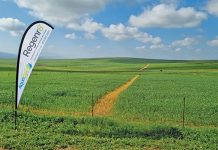It’ s highly unlikely that more than 2 million tons of wheat will be harvested in South Africa this year, because conditions in the Free State, in particular, have deteriorated so dramatically since the last estimate.
This is according to Nico Hawkins, Grain SA’s senior economist. e said the lack of rain in the State was exacerbated by prevailing westerly winds which caused extensive damage to crops. “The extreme temperatures of the last few weeks also affected irrigation areas and therefore yield will be adversely affected. I speculate that the harvest could be as much as 193 200t less than expected, calculated on a five-year average production in the province,” he said. The situation has further been aggravated by the sharp decline in wheat prices. The Safex price for wheat on 30 June was R3 909/t compared to a price of R2 970/t for delivery in December.
“The decline could possibly be related to an increase in supply of wheat on international markets, combined with the fact that the world is in a state of shock after the recent economic disaster,” explained Kobus Laubscher, Grain SA’s CEO. “The markets are jittery and people are holding on to liquidity. We will have to import wheat and given the current exchange rate, this will markedly contribute to an increase in food inflation. – Annelie Coleman








